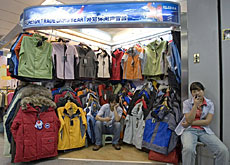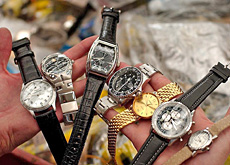Nations join forces to check counterfeit boom

Global business and political leaders aim to identify new ways of curbing the rampant growth of counterfeiting and piracy at a conference in Geneva this week.
Justice Minister Christoph Blocher, who earlier this month announced plans for tough new measures to address the problem in Switzerland, opened the two-day event on Tuesday.
According to the World Intellectual Property Organization (Wipo), which is hosting the meeting, conservative estimates put the economic costs of the illegal trade at more than $100 billion (SFr125 billion).
The piracy of brand products causes an estimated SFr2 billion in damages to the Swiss economy each year. The government launched a Stop Piracy billboard campaign earlier this month to raise public awareness of the potential risks of buying counterfeit goods.
“Today almost every product on the market is a target of counterfeiting and piracy, endangering human health and safety, and undermining economic development,” said the Geneva-based Wipo in a statement ahead of the conference.
China
Among the worst offenders is China; according to the European Union, 84 per cent of goods seized by customs officials stem from the rapidly expanding Asian country. The Swiss watchmaking industry says China is the number one producer of fake timepieces.
Felix Addor, deputy director of the Swiss Federal Institute for Intellectual Property, told swissinfo that a big part of the reason for China’s poor performance was the size of the country – and the fact that it had only recently joined the World Trade Organization (WTO).
He noted that intellectual property (IP) had been a key issue surrounding its accession in 2001 and China was now having to meet specific WTO standards on IP protection and enforcement.
“To fully implement and enforce all these measures will certainly take time,” he said. “But I am convinced that eventually the situation will improve, not least because China’s economy is growing rapidly and Chinese companies active in research and development have a strong interest in a more effective protection of their IP rights.”
Illegal trade
But Addor says tackling the illegal trade is not just about getting tough with offending countries.
He believes industrialised nations also need to put their own house in order by persuading citizens not to buy fakes abroad and by enforcing strict measures against the transit of counterfeit goods.
Referring to Switzerland’s “disreputable” second place after China as an origin of counterfeit goods entering the EU, Addor said the government was taking steps to enhance enforcement and border measures, and to tighten IP laws.
He explained that while there was hardly any production of pirated and counterfeit goods in Switzerland, the country was being used as a transit platform by counterfeiters – a point also made by EU Commissioner Làzlò Kovàcs.
Participants at the conference will also be asked to step up efforts against the expanding illegal trade in counterfeit drugs. It is estimated that counterfeits make up more than ten per cent of the global drugs market.
The United Nations says patients in developing countries are particularly vulnerable as the most counterfeited medicines are those used to treat life-threatening conditions such as malaria, tuberculosis and HIV/Aids.
“According to the World Heath Organization, an estimated 25 per cent of the medicines consumed in developing countries are believed to be counterfeit,” said Wipo.
swissinfo, Adam Beaumont in Geneva
Multinationals meeting in Geneva on Monday ahead of the conference called for “urgent help” from governments to fight piracy and counterfeiting.
The Business Action to Stop Counterfeiting and Piracy group, which includes Vevey-based food giant Nestlé, blamed lax government enforcement as the primary cause of intellectual property theft.
China and Russia were accused of being the worst countries for business piracy and counterfeiting “by a large margin”.
A report issued by the International Chamber of Commerce found that Switzerland is seen by business as taking a strong line against counterfeiters.
The two-day meeting is being organised by Wipo, in conjunction with Interpol and the World Customs Organization.
An estimated 700 participants are attending.

In compliance with the JTI standards
More: SWI swissinfo.ch certified by the Journalism Trust Initiative


You can find an overview of ongoing debates with our journalists here. Please join us!
If you want to start a conversation about a topic raised in this article or want to report factual errors, email us at english@swissinfo.ch.